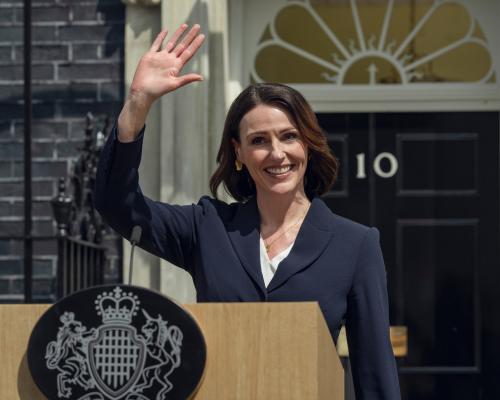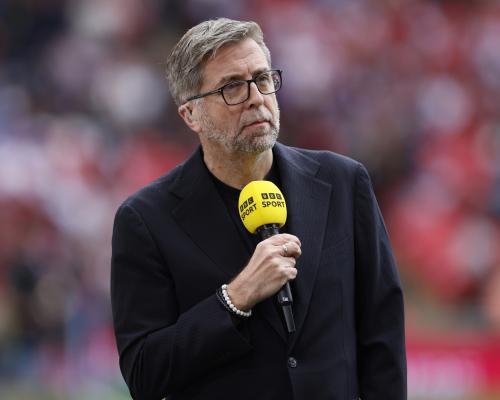
Hostage is a political thriller, and observes the conventions in many ways. The pace is absolutely flawless, it’s twisty, it has emotional heft. The British prime minister, Abigail Dalton, played by Suranne Jones, faces her husband, Alex Anderson (Ashley Thomas), being kidnapped. Their marriage is well drawn – “it’s happy, it’s assured, they’re supportive of each other,” Jones says. As we chat in Netflix’s central London offices, she’s always saying five things at once, only one of them out loud. Here, the subtext (I’ve decided) is: it’s actually pretty skilled work, creating a not-schmaltzy, passionate but familiar love match in which all the audience’s hopes and prayers are with the abducted spouse. That’s why normally when fictional politicians are the victims of a family kidnapping, it’s one of their kids.
Meanwhile, the French president, Julie Delpy’s Vivienne Toussaint, is also in Britain, is also being blackmailed, and has her own dilemmas: principally, does she go over to the dark side, by echoing the far right on anti-immigrant narratives, or stick to her principles, whatever those may still be. Delpy is hilarious on this, and actually most things. “That’s something I found interesting in the show. Sometimes I wonder, I truly wonder, is there any politician who really has a conscience? I look at Macron – I cannot believe someone with a conscience wouldn’t be questioning themselves, questioning who they have picked [as a cabinet], questioning what’s going on with French politics.” “You really wonder whether any politician has a conscience?” I ask, just to be clear. “Well, yes.”
Hostage came about through a lot of to-and-fro between Matt Charman, the writer and creator, and Suranne Jones – the pair shared an agent 10 years ago and always got on. He’s most famous for Bridge of Spies, which Steven Spielberg directed and the Coen brothers co-wrote, in 2015. “Every time I watch Suranne,” he says, “I’m aware of how relatable and human she is. I thought: ‘OK, if she were prime minister, maybe I would feel differently about political drama. What if we bought ourselves goodwill with someone like Suranne, that would allow an audience just for a second to say: ‘Hang on a minute. Let me hear her out’?”
As much as Charman is a storyteller, enamoured of the thriller form, he also has this surprising sense of civic purpose, of using the show to suggest that maybe if we thought of politicians as fully human, they might turn out to be, well, at least human-adjacent. “Someone used the phrase ‘sophisticated protein’, and it’s one of those American phrases that makes you wince, but truthfully it’s quite an interesting formulation. People might enjoy the propulsiveness of the thriller, but they want the values of the lead character to be about something and their backstory to be meaningful.”
The result is quite unusual, in so far as – unlike all political thrillers – it doesn’t remind you of any other. It’s a little biting but it’s not House of Cards cynical, it has a breakneck pace but it’s not 24, the dialogue is sharp but never played for laughs. Jones is relatable, patriotic, trying her best, absolutely in love with her kidnapped husband, an almost nostalgic portrait of an idealised prime minister from more innocent times. Delpy is far more worldly, far more compromised, both a better fit for the turbulence of modernity and more likely to be capsized by it. The whole dynamic marches in an interesting syncopation with the real-life politics that unfolded as they shot it, in which the far-right pressures on the European political landscape have become much more pronounced, and through that lens you could squint at it and see it almost as documentary drama. Then there’ll be a giant explosion outside Downing Street or a kidnapper in an eerie mask, and you’re back in the world of the blockbuster summer thriller.
“The hardest thing about writing something that’s in dialogue with where we are now,” Charman says, “is that every time something happens in real politics, mainly you’re thinking: ‘What does this mean for my kids, is the world OK?’ But on a low level, you’re thinking: ‘Does this mean my drama is going to be out of date when it comes out?’”
“I thought it was very clear as a story,” Delpy says. “To me it seemed very accessible, and actually quite entertaining.” She’s a breath of fresh air, talking about her work, never breathy, always surprisingly impartial, like a mother saying about her children: “Yes, the middle one’s quite intelligent, but the youngest, not so much.” She’ll never buy into the idea that politicians are inherently interesting – “at least in France, I’ve never really been amazed by any of them” – and thinks, in some ways, drama is miles from the reality of politics, by definition, because real life has lost the plot.
“The way politics works now, is that they bombard you with outrageous things, so that you forget what happened yesterday,” she says. “It’s almost impossible to stand against anything. It’s a very difficult time.” Yet one central theme, the demonisation of migrants for political capital, dominates her character’s arc. “She starts off as someone who isn’t flirting with the extreme right, and she slowly starts to go there – which is something you see happening a little bit to everyone in the centre; they’re not necessarily ideologically far right, but they’re feeling they have to flirt with it, to comply with the perceived demands of the electorate. They think it’s better if we slide to the right to stay in power, rather than having the far right in power. I think they really do believe that, you know.”
Drama is making its own, more subtle compromises with the new right, which is to avoid “not just leftwing projects but anything that has any views on social issues at all. Unless it’s pure entertainment with no political consciousness whatsoever, unless it’s The Troll 5, it’s hard to get it made,” Delpy says. “I made a film recently called Meet the Barbarians, it’s about refugees. And it was really hard to find funding for it. And it’s a comedy, it’s really entertaining. Hostage also was not the easiest thing on the planet. Of course they had Netflix, and once you have that all is well, but every project has its hurdle.”
Suranne Jones is also an executive producer on Hostage. “I was born with a clipboard,” she says, “literally, came out of my mum’s womb, ticking things off on my to-do list. I have no interest in directing, no interest in telling other actors what to do or my vision. But finding new talent, putting teams together, the writers’ room process, the imagining of what a show could look like, the aftermath – I love all that.” It made her very unprecious about the edit. “I really felt I needed to put the human into the prime minister, constantly. And, actually, we probably edited a lot of that out.”
Hostage is plainly female-led, in the sense that the leads are women, as are the two directors – Isabelle Sieb and Amy Neil – but that doesn’t feel like a laboured or radical act. You don’t get the sense that these fictional female leaders have brought an emotional range that men couldn’t possibly have, nor that you’re in an idealised near-future where electorates have finally woken up to the fact that women can be in charge. “In the US, they have this very negative view of women in politics, but it’s not like that in Europe,” Delpy says simply.
If anything, Hostage makes a subtler gender point, that the differences within the sexes are greater than any between them. “Suranne and Julie present such a different view of what a powerful female leader is,” Charman says. “Julie’s got this incredible directing career, an amazing track record in French and American cinema. And there are not many people who burn as brightly on screen as Suranne. I thought: ‘what would it look like for them to go toe to toe?’”
A lot of people have called Hostage the new Bodyguard, partly because it’s so satisfying as drama – the way it races, the way it pays off, the way you don’t feel as if you’re being played, even though someone’s always in charge of your emotions and it’s definitely not you. Yet you wouldn’t call it escapist, when so many moments and gestures in it clarify rather than distract from the chaos and impossible choices of the world we’re in. Or, at least, the world we’re in today. Julie Delpy says: “One friend of mine, who survived the second world war, said: ‘Things can always get worse. You think you’re in the worst situation but, unfortunately, there’s always worse than what you think is the worst.’” Against her sardonic pessimism, Charman can sometimes sound almost innocent. “If you can pull the humanity through the thriller all the way to the end, then hopefully you’ve got the journey that you always wanted to go on,” he says, winningly. After all, thrillers need some innocence.
Hostage is on Netflix on 21 August.






